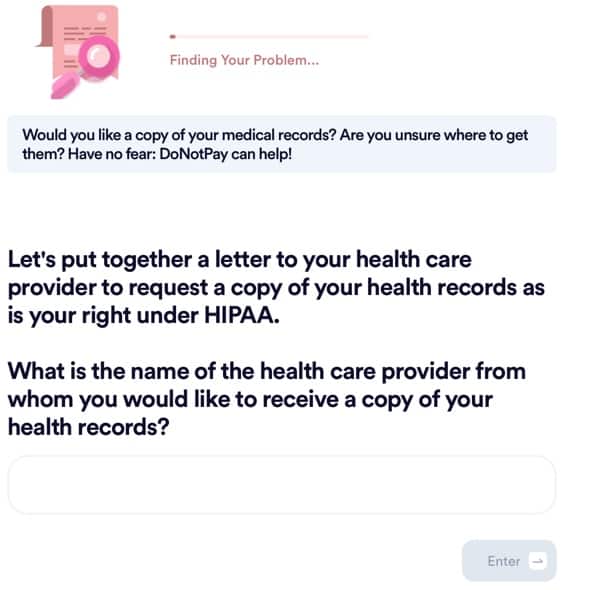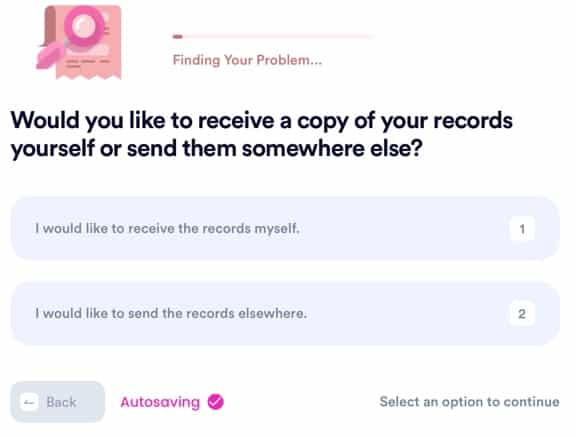Do You Have a Right to Your Harbor UCLA Medical Records?
Medical records are all documentation that is kept about a patient's medical history and treatments. Detailed records must be maintained so that the patient's health journey can be accurately documented at all times. If a patient moves from one medical facility to another, it should be no challenge at all to get your medical records for a new doctor to take a look at their medical records and see many important facts about that patient immediately. The question is, do you have a right to your own ? DoNotPay can help you out with that question.
Your Rights to Medical Record Access
Your or medical records obtained from any medical facility are legally something that you have a right to. You may or may not realize the importance of having access to these records, but it is a good thing that you do because you can learn a lot about your own medical history by reviewing what you have had done in the past.
The laws that govern medical records are referred to as HIPAA laws, and they specifically govern who is and is not permitted to view specific documents. Here is a list of those who are allowed to by law:
- The patient themselves
- The medical personnel who are directly involved in the treatment of the patient
- A parent or guardian of a minor
- A caregiver or advocate who has written authorization from the individual they oversee to view their documents.
- A lawyer who has written authorization from their client to allow them to view the documents
The list of people that are allowed to pry into those documents is very limited, and this is done on purpose. No one wants someone they don't know or don't trust snooping around in their medical records. It can all be avoided if HIPAA laws are followed as they are supposed to be.
How to Get in Touch With Harbor UCLA for Your Medical Records
Here’s the contact information for requesting your medical records at Harbor UCLA:
| Harbor UCLA Contact Information | |
| Address | 1000 West Carson Street
Torrance, CA 90509 |
| Department | Medical Records/Release of Information |
| Phone Number | (424) 306-4100 |
| Hours | Monday – Friday
8:00 AM to 4:30 PM |
For other inquiries, you may reach the Hospital Operator at (424) 306-4000, 24 hours a day.
Can You Receive Your Records Electronically?
You can absolutely receive your electronic health records if you wish to do so. All that you will need to make sure you do is send in the proper documentation to the people in charge of getting those records out so that they know what you are requesting and why-–medical records are only kept for a certain amount of time.
Here are the documents that they will need from you to make this happen:
- A valid form of ID
- Your full name
- Your social security number
- Your address, e-mail address, and phone number
- A list of the specific records that you are requesting
- Your signature
Send all of that information to the facility that you are requesting your medical records from and they ought to be able to help you. With all of those details in hand, the facility should produce your documents for you without any issues.
Just make sure you are prepared to provide every scrap of information they need so you don't get denied. Most facilities are very observant about not giving out medical information unless they are legally authorized to do so.
Are There Costs Associated?
Yes, there are costs associated with getting your records sent to you. Different states charge different amounts, and a lot of it comes down to how you have the records sent to you. Some of the types of charges that states go after include:
- Cost per page (for printed records)
- Administrative costs (to pay the people who locate and send the records)
- Special fees
Occasionally, you may discover that some states charge a very large amount to get medical records out to you. It all depends on the state laws and the ability of the individual facilities to charge what they want for the records.
If you happen to come across a facility that charges a large amount for its services, just know that you may have no other choice but to pay them what they want if you wish to get your records.
Can DoNotPay Help You Get Your Records?
As a matter of fact, DoNotPay can certainly get records out to you. You just need to follow their straightforward procedures for getting those records in hand, and you will be all set.
DoNotPay has seen these requests before and knows how to write your health care provider a simple, clear, and effective letter that will get your legally-guaranteed health records for you in no time.
Here’s how to request medical records using DoNotPay:
- Look up medical records on DoNotPay's website.

- Enter the name of the health care provider you'd like to receive medical records from.

- Answer a few questions about your provider and where you'd like to send the records.

DoNotPay can help you obtain medical records from different facilities, including:
- Kaiser Permanente
- Mercy Hospital
- Cleveland Clinic
- Baptist Medical
DoNotPay Can Do More
DoNotPay has done a terrific thing by offering its services in the medical records space, but they don't stop there. There are many other things that they offer their users every day including:
- Help to get pet licenses
- The chance to reduce your property taxes
- The ability to remove unwanted background images
- The chance to file complaints against your neighbors for noise
Whatever you need them there for, DoNotPay will arrive to help. Check out their full plate of offerings at their and see which services could prove useful to you.
 By
By